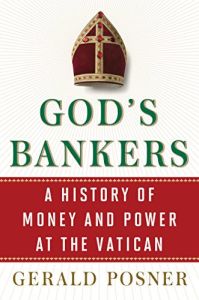Join getAbstract to access the summary!

Join getAbstract to access the summary!
Gerald Posner
God’s Bankers
A History of Money and Power at the Vatican
Wall Street Journal Books, 2015
What's inside?
Prepare to be surprised and dismayed by this detailed, well-researched history of the Vatican’s financial practices.
Recommendation
Veteran author and reporter Gerald Posner provides a well-researched history of the Vatican’s finances. He describes a pattern of Vatican insiders and business partners taking financial advantage of the secrecy that the Vatican’s sovereign status provides. His most compelling reportage covers the Roman Catholic Church’s notorious failings during the Holocaust. Posner details the Church’s self-preserving favoring of Italian Fascists and German Nazis due to its fear of “godless bolshevism.” Pope Pius XII’s failure to chastise the mostly Catholic perpetrators of the Holocaust proves deeply disturbing, as does the Church and its bank’s assisting a “ratline” of Nazis to escape to Argentina after the war. The Church’s cover-ups in response to child abuse claims also prove damning. Today’s push toward financial propriety, driven by the assertive, admirable Pope Francis, makes for an uplifting ending. Posner comes down on the negative events in Vatican history, and doesn’t dwell on the Church’s charity or good works. He treats hard issues as fair game and provides fascinating material on the Fascist era. While always neutral on religion and politics, getAbstract recommends Posner’s riveting reporting and sobering lessons about human fallibility, however much reverence those failed humans accrued.
Summary
About the Author
Gerald Posner’s books include Miami Babylon, Motown, Citizen Perot and Warlords of Crime. He contributes to NBC, CNN and the History Channel.

















Comment on this summary